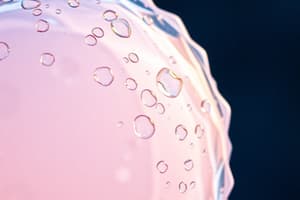Podcast
Questions and Answers
What is the main reason why water from oceans and seas is not suitable for consumption?
What is the main reason why water from oceans and seas is not suitable for consumption?
- Because it is salty (correct)
- Because it is acidic
- Because it is alkaline
- Because it is not filtered
What is the term used to describe the level of water under the ground?
What is the term used to describe the level of water under the ground?
- Water table (correct)
- Water level
- Water surface
- Groundwater level
What is the process by which water is added to the atmosphere through plants?
What is the process by which water is added to the atmosphere through plants?
- Photosynthesis
- Evaporation
- Transpiration (correct)
- Respiration
What is the result of glucose and oxygen combining in living organisms?
What is the result of glucose and oxygen combining in living organisms?
What percentage of the Earth's water is fresh?
What percentage of the Earth's water is fresh?
What is the primary source of freshwater on the Earth?
What is the primary source of freshwater on the Earth?
What is the process by which water circulates between the land, water bodies, and the atmosphere?
What is the process by which water circulates between the land, water bodies, and the atmosphere?
What percentage of the Earth's freshwater is available for use?
What percentage of the Earth's freshwater is available for use?
What is unique about water on the Earth?
What is unique about water on the Earth?
What is the primary function of rainwater?
What is the primary function of rainwater?
Flashcards are hidden until you start studying
Study Notes
Importance of Water
- Water is vital for all life on Earth, from microscopic life to plants, animals, and humans.
- It plays a crucial role in various living processes, including digestion, excretion, regulating body temperature, hydration, protection, and lubrication.
Composition of Living Things
- Human beings, animals, and plants contain water in varying proportions.
- Eatables like fruits, vegetables, eggs, and milk contain water in different proportions.
Distribution of Water on Earth
- About three-fourth of the Earth's surface is covered with water.
- 97% of the Earth's water is salty and present in oceans and seas.
- Only 3% of the Earth's water is fresh, and of this, 2.5% is locked up in glaciers and polar ice caps.
- Only 0.5% of the freshwater is available for use in rivers, lakes, ponds, and underground water.
Properties of Water
- Water is the only substance on Earth that exists in solid, liquid, and gaseous states at different temperatures.
- It dissolves many substances, including salts and nutrients, which are important for living things.
Sources of Water
- Rainwater: considered the purest form of water, formed through condensation of water vapors in the atmosphere, and falls as rain.
- Surface water: consists of water present in oceans, seas, rivers, lakes, etc., with a large amount of salt dissolved in it.
- Groundwater: rainwater that seeps down and accumulates under the ground, forming a water table, and can be obtained from wells, tube wells, and handpumps.
Water Cycle
- The continuous circulation of water between land, water bodies, and the atmosphere is called the water cycle.
- Water is added to the atmosphere through processes like evaporation, respiration, burning of fossil fuels, and transpiration.
- Water vapor in the atmosphere cools down, condenses, and forms clouds, which eventually pour down as rain.
Studying That Suits You
Use AI to generate personalized quizzes and flashcards to suit your learning preferences.




